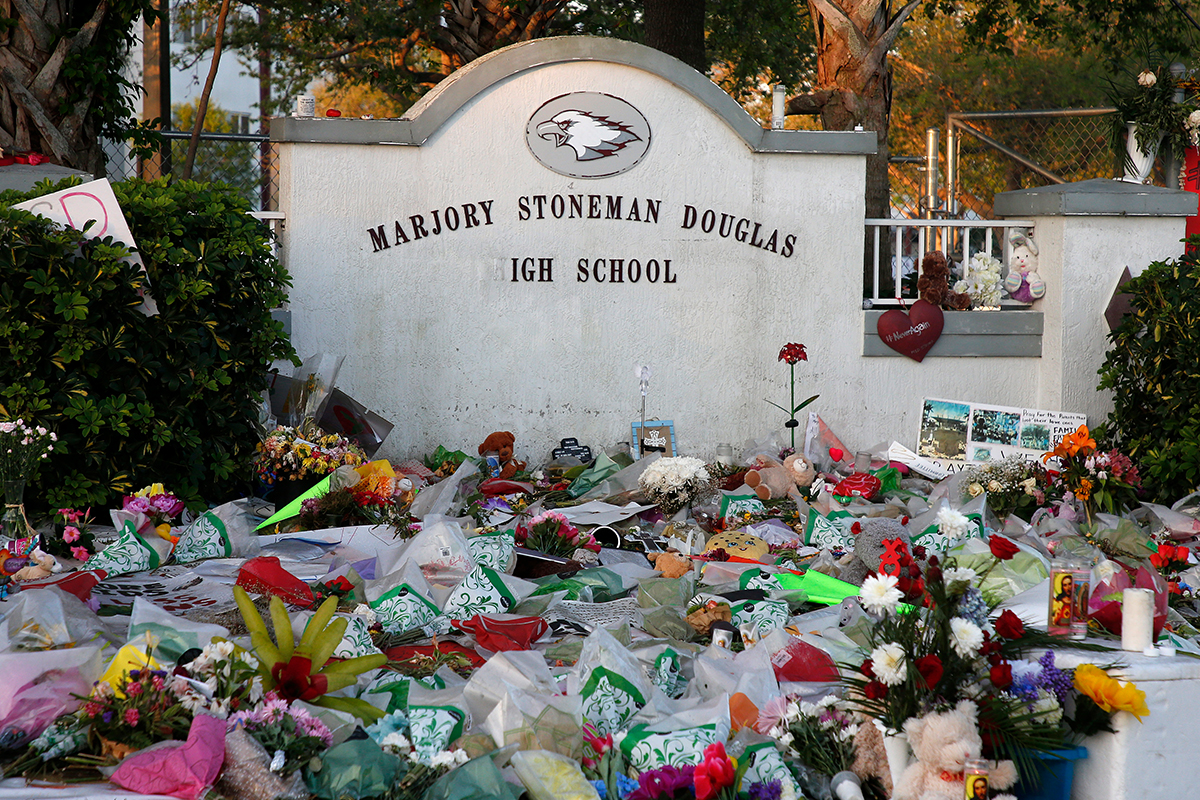In the summer of 2019, I visited my parents in Boca Raton, Florida, where I grew up. We attended a JCC yoga class, and afterward, the yoga teacher approached my mom.
“Are you a Douglas parent?” she asked. My mom said no, that my brother and I attended another public school nearby. “Oh, sorry,” the teacher said. “I thought you looked familiar. My son goes to Douglas, and a lot of Douglas parents have been coming to my class, since, you know.”
At the time, it had been about 18 months since the tragic events on February 14, 2018 at Marjory Stoneman Douglas, the neighborhood high school where a teenager opened fire and killed 17 people. How can a parent cope with the thought that they might send their kid to school, only for them to never come home? For parents in our South Florida neighborhood, this fear isn’t abstract. So, even though some time had passed since the shooting, it made sense that parents would still be searching for a way to cope with this anxiety.
Now, as the three-year anniversary of the tragedy approaches, so much still feels the same. I remain deeply inspired by the survivors-turned-activists from Parkland who organized the March for Our Lives and have continued to advocate for gun control. But it’s not as though hate-fueled violence has gone away.
When we talk about the Parkland shooting, it’s necessary to remember that Marjorie Stoneman Douglas High School has a significant Jewish population, and the shooter was openly antisemitic and racist. Just eight months later, Jewish people were shaken once more by the shooting at the Tree of Life Synagogue in Pittsburgh. And now, weeks after neo-Nazis stormed the Capitol, the burden of antisemitism feels especially acute.
Earlier this month, Representative Marjorie Taylor Greene (R-GA) was inaugurated into the U.S. House of Representatives (yes, she’s the one who wore a mask that said “censored” while her speech on the House floor was televised nationally). In recent weeks, we learned about Facebook comments that she made in 2018, where she doubted that the Parkland shooting was real, claiming it was staged by Democrats to push for gun control.
That wasn’t the first time that Rep. Greene has touted a harmful conspiracy theory, but as a Jewish person who grew up near Parkland, this one hit differently for me. We know what it’s like to have our community’s trauma called into question. Just a year and a half ago, a principal at another high school in Florida questioned whether the Holocaust happened.
I’ve witnessed first-hand the lasting trauma that the South Florida community has suffered after the events at Parkland. I often think about how on February 20, 2018 — six days after the shooting — hundreds of students from my high school walked out of their classes. In the unrelenting Florida heat, which sears strong even in winter, they continued walking for 12 miles until they reached Marjory Stoneman Douglas High School, where 17 memorials decorated the school’s perimeter. Despite the threat of detention, suspension, or zeroes on quizzes, these students decided it was more important to show their peers across town that they cared, that they were listening, and that they demanded change.
This act of resistance moved me, especially since I could never have imagined this sort of united student activism happening when I was a student at West Boca High School. But now, young people are fighting back out of necessity, because the world around them demands it.
The problem with writing about grief — and the problem with grief, really — is that you can’t make sense of it all, even years later. I often wonder if the Parkland survivors are doing okay, especially those who have become public figures in the midst of their trauma. I think about how surreal it is that even my high school, 12 miles away, was forever changed. How even those like me who left South Florida still felt the dread and trauma that buzzed through the humid air in the days, and weeks, and years after the shooting. In our predominantly Jewish community, we are still processing our grief that an event like this could happen here, and continues to happen at other schools and places of worship.
Now, Rep. Greene is using the Parkland shooting as a means to push legislation that would overturn the Gun-Free School Zones Act of 1990, which prohibits unauthorized people from bringing guns into schools. It’s another punch in the gut, especially when it directly opposes the work of the Parkland shooting survivors who are advocating for tighter restrictions around gun ownership. Fred Guttenberg, whose 14-year-old daughter was killed in the Parkland shooting, tweeted an old video of Rep. Greene harassing survivor-turned-activist David Hogg on the street before she was an elected official. Cameron Kasky and David Hogg — two of the Parkland shooting survivors who went on to help found March for Our Lives — have called on Rep. Greene to resign. (Greene was recently stripped of her committee assignments, citing apparent threats against her colleagues.)
Even as a new administration takes over in the White House, with images of domestic terrorism still vivid in our memory, we must remember these acts of violence aren’t anomalous. While Trump’s hateful rhetoric certainly didn’t help, it’s not as though white supremacy, antisemitism, and xenophobia have only existed since Trump’s election — and it’s not as though the end of Trump’s term means that this will go away.
As Jewish people, we often repeat the refrain “never again.” We must remember how we feel in the wake of these antisemitc acts and advocate for change so that one day, our refrain can actually ring true.



